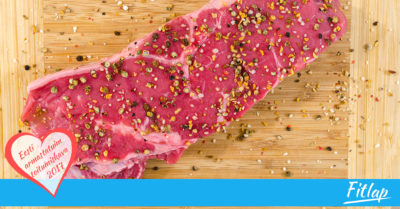A protein-heavy diet is extremely popular today. But did you know that simply eating large amounts of protein without thinking doesn’t improve your health, doesn’t help lose weight and doesn’t make your brain work more efficiently? In order to see good results and feel good, you need a thought-through strategy. What I mean by this is that your meal plan has everything in place – the protein, fibre, good carbohydrates as well as fats.
I’ll start by stating in no uncertain terms – your food must contain protein. This allows you to better lose body fat without losing your muscles. There’ve been quite a few surveys over the years where having enough protein has helped lose weight effectively.
One important thing does need to be kept in mind with protein. Namely, the importance and efficiency of protein comes to the fore particularly when losing weight. When the overall amount of food is limited.
How much protein?
A weight loss diet comparison carried out by the European Journal of Clinical Nutrition revealed that diets with a higher protein content could ensure a bigger loss of body weight than diets with a lower protein content.
It was also found that muscle mass was well preserved when at least 1.6 grams of protein per kilogram of the body per day was ensured.
And yet, mistakes are made when following high-protein diets, which may eventually result in various health issues.
Fibre
For best results, your food must contain enough fibre. And you can’t get that from meat alone. It has been found that fewer than 3% of Americans get enough fibre from their diets. A sufficient amount of fibre helps keep your stomach full and digestion in order.
Did you know that fruit and vegetables aren’t in fact packed with massive amounts of fibre? This is why they need to be consumed smartly.
In short, you need to be very careful about what you eat alongside your protein sources. One apple or carrot simply isn’t enough. If necessary, you need to take additional fibre supplements.
Good fat
In addition to having enough fibre, it also pays to focus on getting enough “smart” fats from your food. The best sources for these are fish, grass-fed cattle, coconut oil, olive oil, nuts, avocado, etc.
Eating these smart fats supports the health of your cells and helps improve insulin sensitivity.
All this in turns helps avoid a situation where your body switches to a body fat preservation mode, which is a very bad place to be for burning fat.
Healthy carbohydrates
A high-protein diet does not mean leaving carbohydrates aside entirely. Full carbohydrates such as vegetables, roots, berries, cherries, grapefruit, kiwis are full of antioxidants which help combat the free radicals in your body.
These are nasty critters that accelerate the aging of your cells. A low antioxidant level in your blood can also lead to inflammations in the body. All this will make your journey towards a healthy body that much harder.
In addition to vegetables and fruit, a moderate amount of various whole-grain products is also allowed.
Tell us in the comments whether you’ve tried a high-protein meal plan!




